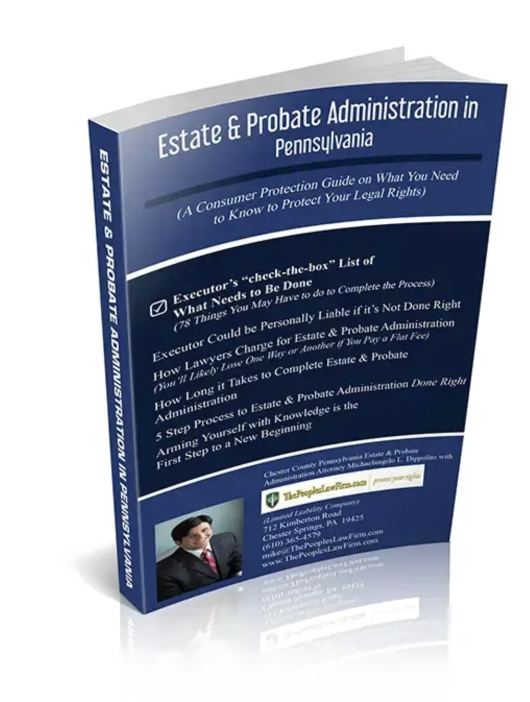The days following a loved one’s death are filled with emotional anguish and social requirements to fulfill, including planning a funeral or memorial service and burial.
Once the initial grief has ebbed, the person named as the decedent’s personal representative becomes the administrator of the estate, a sometimes daunting task for an individual with no legal experience.
Fortunately, if you are the administrator of a loved one’s estate in Caln Township, you don’t have to navigate the process alone. Instead, contact the Pennsylvania Probate lawyers at ThePeoplesLawFirm.com for help.
Why ThePeoplesLawFirm.com Might Be Right for Your Probate Process In Caln Township
Being named the administrator of a loved one’s estate is both an honor and a legal duty. An unintentional error or oversight can cause delays, conflicts, and even personal liability.
For this reason, hiring attorney Michaelangelo L. Dippolito brings the following advantages:
- A skilled attorney with over 25 years of experience in Pennsylvania’s estate and probate systems to guide you through the process
- A legal staff working behind the scenes to ensure the most efficient and effective process occurs to honor your loved one’s wishes
- A trusted attorney working with compassion and professional excellence to resolve any conflicts or other complications that arise during the probate process
ThePeoplesLawFirm.com offers a free phone consultation to prospective clients so you can learn more about how an estate administration and probate attorney in Caln Township can help you through the process of administering your family member’s estate.
How Does Probate Work In Pennsylvania?
Probate is the state’s legal process used to facilitate an orderly transfer of an estate to beneficiaries after a death. The person who serves as the estate administrator must first locate the will and other crucial documents, such as living trusts and life insurance policies, and then obtain multiple certified copies of the death certificate.
Then, the probate process requires the following steps:
- Filing the will and death certificate with the county’s Will Register Office
- Petitioning the county’s probate court to open a case and paying a probate fee based on the value of the estate
- Waiting for authorization letters to begin the probate process as the estate administrator
- Notifying the beneficiaries, creditors, and tax agency about the opening of probate
- Placing a public notice in area newspapers (typically at least two) to notify the public of the probate in case unknown creditors want to file claims
- Inventorying the contents of the estate to make a list of assets and debts
- Paying all debts and taxes owed through the method outlined in the will, sometimes requiring the sale of property
- Making periodic status reports to the probate court, noting any sale of property
- Distributing the remainder of the estate to heirs according to the specific bequests and guidelines of the will
If a loved one dies without a will, the probate process requires the court to appoint a family member as the probate administrator, with asset distribution governed by Pennsylvania’s intestacy laws for inheritance succession.
What Is “Fiduciary Duty” In Estate Administration In Caln Township?
As the probate administrator, you have what’s called a fiduciary duty to the estate. This means your actions during estate administration must reflect the best interests of the estate and its heirs.
This duty also leaves you, as the administrator, personally responsible for any errors or missteps, and could result in personal liability for deficits even if they occur through an honest mistake.
Contact a Caln Township Estate Administration & Probate Attorney at ThePeoplesLawFirm.com for Legal Counsel
No one should have to navigate a challenging legal endeavor without experienced counsel. Instead, contact Michaelangelo L. Dippolito at ThePeoplesLawFirm.com to learn more about how a Caln Township estate administration and probate lawyer can help you.





